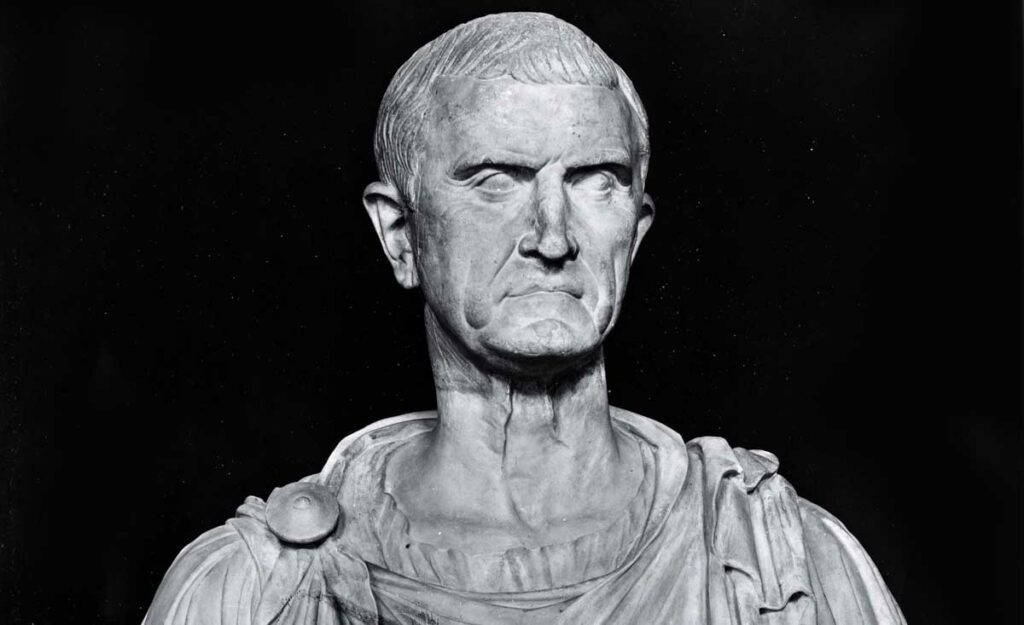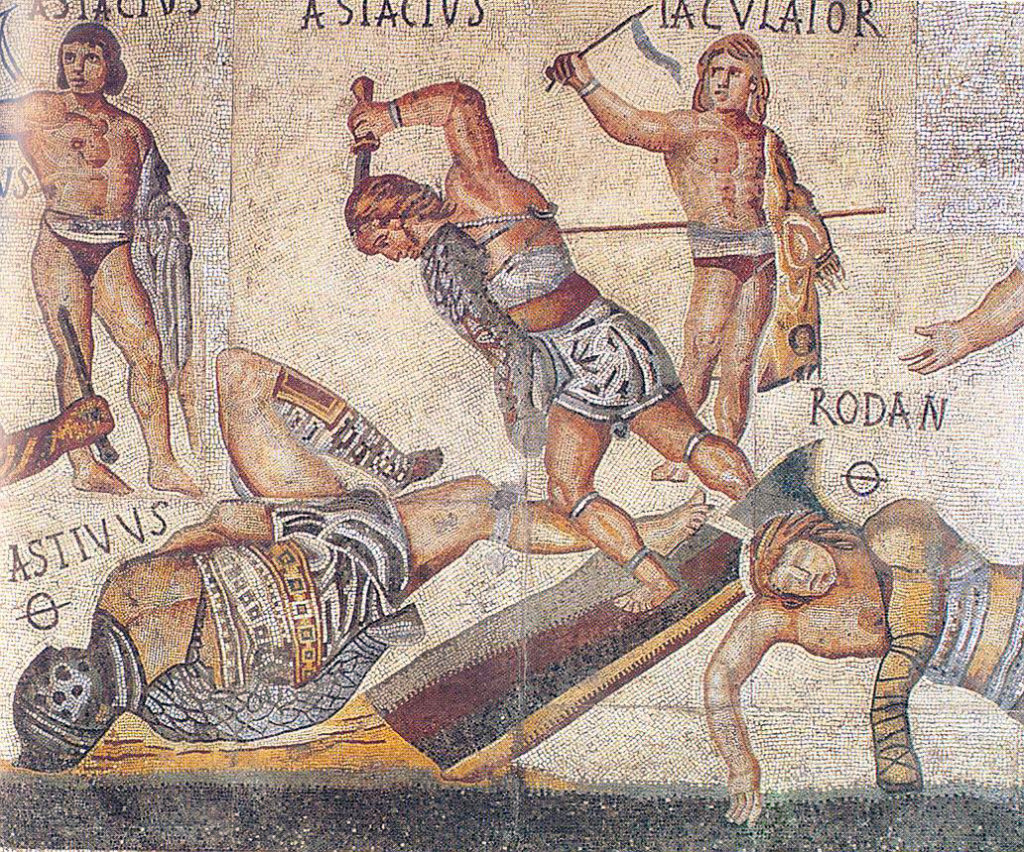The sweltering heat of the Parthian desert was a terrible place to die. Stricken with grief at the death of his son, and exhausted from battle, Roman general Marcus Licinius Crassus met his end in that miserable place.
Crassus’s death, as well as what happened to his body after death, is shrouded in mystery. Whether he died in battle or was slain by one of his own men to avoid capture is up for debate, but what isn’t is the fact that Crassus’s death forever altered the course of Roman history.

Marcus Licinius Crassus: The Richest Man in Rome
Crassus was not always considered the richest man in Rome, but he spent nearly all his life wealthy. His bloodline was that of an old and highly respected Roman family, and his father was a senator.
He was the middle of three sons, but tragedy was on his heels even from youth. His older brother perished near the time of the Italic War. Later, Crassus’s father and younger brother died while being pursued by rival general and statesman, Gaius Marius after their win in the civil war in the Roman Republic, called the Bellum Octavianum.
Following the deaths of his brothers, Marcus Crassus married one brother’s widow, and a woman named Tertulla. They would go on to have two sons.
Sulla’s Civil War
After the aforementioned death of Gaius Marius, Crassus was forced to flee to Hispania and stayed there from 87 to 84 BC. He recruited a few thousand men there and used his limited forces to force local cities to pay for his campaigns.
From there, he sailed to Greece to join Roman General Sulla, who was in the middle of a civil war against the same factions that had forced Crassus out of Rome. In Greece, Marcus Crassus commanded Sulla’s right flank in the battle outside the Colline Gate.
Sulla and his forces were struggling when they got word that Marcus Crassus had obliterated the enemy that his forces were facing. On Sulla’s command, Crassus’s forces pushed towards the center, and his success bolstered the morale of the other troops. By morning, the battle was done, and Rome belonged to Sulla.
Becoming the Richest Man in Rome
At this point, Marcus Crassus was highly favored by the new Dictator of Rome. Sulla enacted heavy proscriptions on those who had fallen into disfavor after the war, and Crassus benefited.
Crassus quickly gained properties that citizens were forced to give up under these proscriptions. These seized properties were quickly scooped up by Crassus and others like him. With this, Crassus started to build his wealth.
He also took advantage of some of the catastrophic fires across Rome, buying the destroyed properties and selling them for profit once they had been rebuilt. Other methods that he used to amass his infamous wealth were slave trading and mining, but real estate remained his biggest money maker.
Crassus’s combination of intelligence and good luck helped him be incredibly successful, and over time, he earned his monitor “The Richest Man in Rome”.
Crassus and the Triumvirate
To further his influence and power, Crassus aligned himself with Julius Caesar and Pompey the Great. The Roman political climate of the time was full of scheming and violence, and any alliance Crassus could make was to his benefit.
Within the Triumvirate, Crassus used his military acumen to advise Caesar in his conquests, but ultimately, the Triumvirate needed Crassus’ wealth. Crassus became Caesar’s de facto patron, even if he was never named as such.
Crassus as the Governor of Syria
Wealth continued to be the driving force behind many of Crassus’s actions, even to his detriment. After his involvement in the Triumvirate with Pompey and Caesar, Crassus was appointed as the governor of Syria. Like most things involving Crassus, Syria was believed to offer an endless source of wealth.
Had Crassus been content to govern peacefully while accumulating more wealth, then everything might have worked out well for the Richest Man in Rome. Crassus, though, had other things in mind–military glory.
This hunger for power would end up being his downfall.
During his time in Syria, he implemented various unpopular policies. Crassus levied heavy taxes against the Syrian citizens and confiscated valuable treasures, aggravating the local population. He was not popular among the Syrians, but before long, Crassus would set his eyes on the even wealthier Parthia.
The Parthian Campaign and Death of Marcus Licinius Crassus
Crassus’s governorship was marked by his ill-fated military campaign against the Parthian Empire in 53 BC. Eager for military glory to match that of his allies, Pompey and Caesar, Crassus led a poorly planned expedition into Parthia.
He was overly confident from his previous victories, and he could have bolstered his numbers even more when the King of Armenia offered to grant him 40,000 troops in exchange for Crassus invading Parthia through Armenia.
Crassus refused, choosing to take a more familiar, direct route into Parthia by crossing the Euphrates. This was a mistake, but not that one that would truly doom him. That mistake was the one he made next.
Ariamnes was an Osroene chieftain that had helped Pompey during his campaigns previously, so Crassus was sure that seeking the chieftain out for directions would be a safe bet.
What he didn’t know was that Ariamnes was actually being paid by the Parthians, and filled Crassus’ ears with promises that the Parthian military was weak, unprepared, and utterly disorganized. Overly confident with this information, Crassus was more than happy to follow Ariamnes’s suggestion to attack at once, and followed the chieftain as he led Crassus’ troops into the desert, far away from any water source.
Weakened and dehydrated, Crassus and his troops were woefully unprepared to do battle with the Parthians in the Battle of Carrhae. While Crassus had troops that were majority heavy infantry, the Parthian troops attacked instead on horseback, using a calvary-and-arrow type assault that devastated the Romans.
Desperate and refusing to take any advice from his officers, Crassus kept his troops in the testudo formation, keeping them covered with shields and hoping to wait out the barrage of arrows by the Parthians.
What he didn’t know is that the Parthians had other mounted troops, this time on camelback, stationed to continuously supply their cavalry archers with arrows. There was no end to the onslaught in sight when Crassus pulled his troops out to retreat, and when they finally reached the safety of Carrahe, the number of casualties was severe.
Crassus’s troops were furious, and they teetered on the edge of mutiny. They demanded their leader parley with the Parthians, who were ready to come to an agreement to stop the fighting. At first, Crassus had no interest in any form of surrender.
But then, the news that Crassus’ son, Publius, had died in the battle, arrived. Crassus was heartbroken, and in his grief, finally agreed to meet with an opposing General.
The Parthian camp was not far from Carrahe, and after being served a resounding defeat along with the death of his beloved son, Crassus was impatient to be done with the peace talks. He went to mount his horse to ride to the Parthian camp, but before he could depart, his Junior Officer, Octavius, had a bad feeling.
The Junior Officer suspected an ambush, and frantically grabbed the bridle of Crassus’ horse, bringing him to an abrupt halt. A flurry of activity broke out, leading swiftly into a fight between the small groups of Romans and Parthians.
Somehow, during the skirmish, Crassus was dismounted from his horse. He was killed unceremoniously, not in true battle, but in this small fight. Just like that, the Richest Man of Rome was struck down once and for all.
The Golden Legacy of the Death of Marcus Licinius Crassus
The death of Marcus Licinius Crassus sent shockwaves through his troops. Crassus’s demise marked the end of his political career and the removal of a significant player from the complex power struggles of ancient Rome, but it was the manner in which he was killed and what happened to his body after death that reverberates through history.
His death was brutal; according to historical accounts, but there are multiple accounts of how he died.
The most prevalent, and arguably, the most horrifying account of Crassus’ death was that he was executed by having molten gold poured down his throat. The most sensational version of this tale has Crassus being taken alive by the Parthian’s, and therefore, still being conscious as his mouth was pried open and the boiling gold was poured into his throat.
If Crassus really had gold poured down his throat, it’s more likely that he was dead beforehand. Cassius Dio recounts,
“Crassus also was slain, either by one of his own men to prevent his capture alive, or by the enemy because he was badly wounded. This was his end. And the Parthians, as some say, poured molten gold into his mouth in mockery; for though a man of vast wealth, he had set so great store by money as to pity those who could not support an enrolled legion from their own means, regarding them as poor men.”
Another account of Crassus’ death has him dying during the skirmish before the parley, but being humiliated after death by his body being cut to pieces and sent away to be used as props by his enemies.
This version of Crassus’ death has a soldier cutting off his head, shipping it away to Parthian King Orodes II. There, it was used as a prop by an actor who was performing the Greek tragedy, Bacchae, for the King. The actor seized the severed head and with it, sang lyrics from the play while the audience roared with laughter.
Greek historian Plutarch, recalls the event,
“The Parthians lifted it up with clapping of hands and shouts of joy, and at the king’s bidding his servants gave Sillaces a seat at the banquet. Then Jason handed his costume of Pentheus to one of the chorus, seized the head of Crassus, and assuming the role of the frenzied Agave, sang these verses through as if inspired:
‘We bring from the mountain
A tendril fresh-cut to the palace,
A wonderful prey.’”
In the end, it was the overreaching ambition and desire for wealth that killed Marcus Licinius Crassus. No matter the method of his execution, he was humiliated in his demise, losing everything he worked for in the single strike of a sword…or maybe even with a mouthful of molten gold.
References
“The Life of Crassus”
http://penelope.uchicago.edu/Thayer/E/Roman/Texts/Plutarch/Lives/Crassus*.html
“Marcus Licinius Crassus”
“Ridiculous History: Sentenced to Death by Molten Gold Down the Throat”
“Marcus Licinius Crassus”
“Roman History, 40.27”

